“P2P Network Lending Criminal Risk Prevention” High-end Forum was Successfully Held in Peking University
Date:2018-12-19
On December 9, 2018, the "P2P Network Lending Criminal Risk Prevention High-end Forum" jointly organized by Peking University Law School, China Behavior Law Association Financial Law Behavior Research and Beijing Dacheng Law Firm, was held in Peking University Law School Koguan Building Lecture Hall.
Leading comrades from the Supreme People's Court, the Supreme People's Procuratorate, the Ministry of Public Security, Beijing Municipal People's Procuratorate, Beijing Higher People's Court, China Behavior Law Association Financial Law Behavior Research, Chinese Society of Criminology, and representatives from universities such as Peking University, Renmin University of China, China University of Political Science and Law, Institute of Law of the Chinese Academy of Social Sciences, Nankai University, and State Prosecutor's College, as well as representatives from enterprises such as China Construction Bank Head Office, Beijing CITIC Notary Office, Shanghai Pudong Development Bank, China Merchants Bank, and Beijing Hengan Group and lawyers from Dacheng Law Firm, Deheng Law Firm, Huichang Law Firm, Jingshi Law Firm, a total of more than 240 experts and scholars, lawyers and legal practitioners participated. More than 10 news media including Xinhua News Agency, People's Daily, Guangming Daily, Economic Daily, Legal Daily, and People's Daily Website reported on this forum. This forum focuses on the current compliance management and criminal risk prevention of P2P online lending platform, as well as the difficulty in judging judicial practice. It aims to promote the in-depth study of criminal risk prevention of P2P network lending.
Professor Wang Xin from Peking University Law School presided over the opening ceremony of the forum. Professor Pan Jianfeng, Dean of Peking University Law School, Dr. Zhu Xiaohuang, President of the China Behavior Law Association Financial Law Behavior Research, and Dr. Zhao Yunheng, Director of the National Criminal Professional Committee of Beijing Dacheng Law Firm, respectively addressed the forum. Dean Pan Jianfeng pointed out that the seminar is of great significance to promoting the teaching reform of Peking University Law School, and wished the forum a complete success. President Zhu Xiaohuang pointed out that the criminal boundary of illegal fund-raising shall not be too broad, and should adhere to the modest suppression of criminal law, we shall minimize the use of criminal law, improve the efficiency of criminal law, and improve the civil relief mechanism. Dr. Zhao Yunheng expressed the hope that through such a grand meeting, the interaction between all lawyers and Peking University would be deepened.

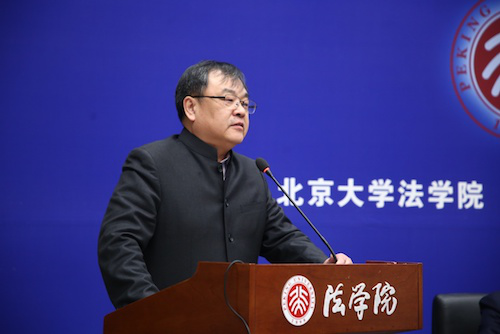
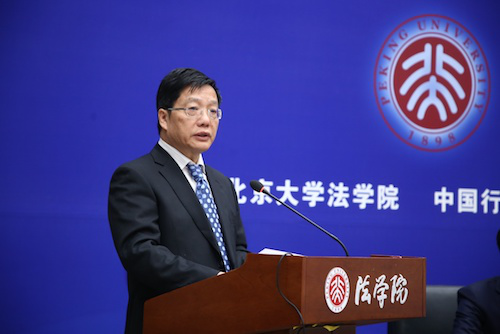

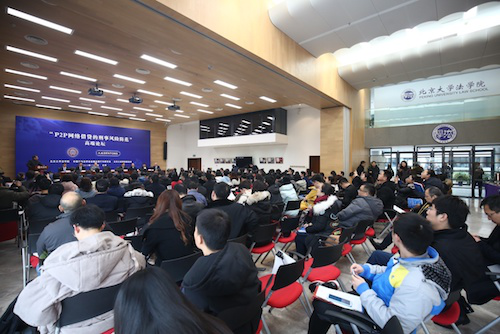
The forum was divided into "subject speech", "P2P online loan platform compliance management and criminal risk prevention", "P2P online loan legal regulation theory and improvement", "P2P online loan criminal justice practice and defense" four unit.
The first unit is the keynote speech session, hosted by Wang Xin, a professor at Peking University Law School. There are five expert leaders in this module to deliver a keynote speech. First of all, Dr. Sun Maoli, Director of the Legal Affairs Bureau of the Ministry of Public Security, delivered a speech entitled “Public Security Organs' Action against Illegal Fund Raising and P2P Network Illegal Lending Work”. He detailed the general situation of illegal fund-raising crimes and the suspected illegal fund-raising crime of P2P network lending platform. In general, he distinguished the types of illegal fund-raising from the perspective of public security practice, summarized the characteristics of cases of illegal fund-raising crimes, and the main practices of public security organs to crack down on illegal fund-raising and related effects. Subsequently, the president of the State Prosecutor’s College and the Chinese Society of Criminology Dr. Huang He, delivered a speech on “Institutional Change of P2P Online Loan Platform: The Scientific and Modernization of Criminal Policy in China's Financial Crimes”. He analyzed the P2P online loan and the changes in the regulatory system and the history of supervision, and pointed out that criminal policy should be engaged in post-criminal regulation and transformation to ex ante comprehensive governance. Afterwards, Hou Tailing, deputy general manager of the Legal Department of China Construction Bank, delivered a speech entitled “The Causes and Improvement Paths of P2P Network Lending Supervision Failure”, pointed out that P2P online lending was innovative, but didn’t change the nature of the relationship between law and basic finance, didn’t solve the problem of truth and objectivity of information. Its business model had a big problem. In the Internet age, big data may be a means of solving information asymmetry. Then, Chen Xueyong, the chief judge of the Supreme People's Court Criminal Court 3, published a speech entitled “Illegal Fund Raising Criminal Cases and Related Legal Issues”. He introduced from the perspective of trial, including the situation and characteristics of criminal cases of illegal fund-raising, the legal boundary of P2P network lending and illegal fund-raising, the identification of illegal fund-raising crimes, and the recovery and disposal of financial cases involved. Finally, Dr. Han Youyi, senior partner of Beijing Dacheng Law Firm, delivered speech entitled "Borrowing and Loaning", analyzed the criminal risks of P2P companies, the logic errors of P2P self-inflation and the paradox of P2P as an information center, and proposed that the legal benefit of 176 articles of criminal law is lending’s principal recover interest.
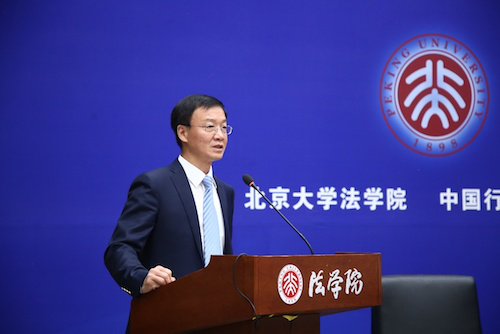
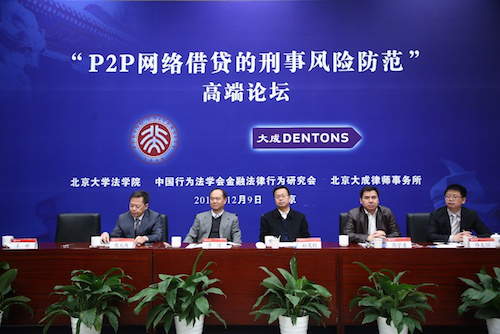
The second unit is “Compliance Management and Criminal Risk Prevention of P2P Online Loan Platform”, hosted by Ping Yunwang, Director of the Financial Professional Committee of Beijing Dacheng Law Firm. Zhou Yueli, a senior partner of Chengdu Dacheng Law Firm and a financial professional committee member, published a keynote speech entitled “Prisoner's Dilemma: The Tracing of the P2P Explosion Tide”. Based on game theory, he used Prisoner's dilemma theory to explode P2P. The reason for the tide had made a unique analysis, suggesting that we should profoundly understand the nature of P2P, enhance the coherence of financial policy application, and encourage legal innovation in supervision, but also be cautious. In the talks, Dr. Yu Haisong, deputy director of the Criminal Division of the Research Office of the Supreme People's Court, pointed out that criminal law is always the last resort and only the right medicine could solve the problem. The procurator of the Beijing Municipal Procuratorate Dr. Tuo’s reported on Zhou’s lawyers, he believed that the position of P2P platform information intermediary should be adhered to. The future of P2P platform governance was bright, and the road was also tortuous. Embracing supervision, transformation and upgrading was the most reliable way out. Beijing Dacheng Law Firm Shenzhen Branch Lawyer Yao Weiqi, a senior partner, pointed out that in response to the legal issues of the P2P platform, politics should be brought to politics, the rule of law should be brought to the rule of law, and the P2P platform should be put forward for the issues of liquidation, auditing obligations and liability, and lenders representing the joint litigation. Mr. Ma Lang, a senior partner of Beijing Dacheng Law Firm Shanghai Branch, combined his own practical experience, published his own unique insights on the P2P platform criminal risk prevention.
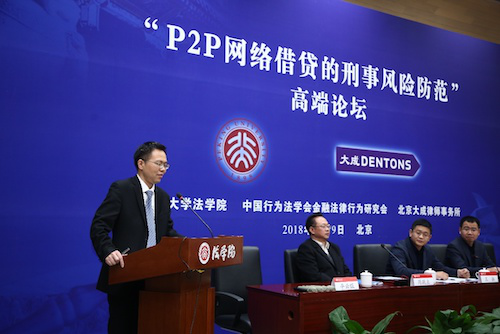
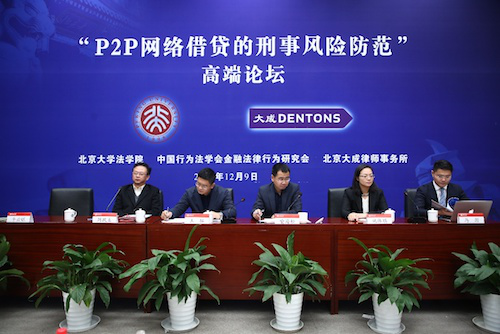
The third unit is "The Theory and Improvement of P2P Network Loan Legal Regulation", presided over by Bai Jianjun, a professor at Peking University Law School. Peng Bing, a professor at Peking University Law School, gave a keynote speech on “F2P online loan supervision failure and reconstruction”. He believed that the failure of P2P online loan supervision was due to the introduction and landing of regulatory rules. It was difficult for P2P platform to solve the lender’s risk identification problem of the borrower, the P2P platform had actually changed from information intermediary to credit intermediary, the sports supervision mode had failed, and the construction of innovative supervision was a new idea. In the talks, Professor Liu Pinxin of Renmin University of China Law School responded to Professor Peng Bing's innovative supervision ideas and pointed out the feasibility of preventing and reconstructing the P2P regulatory system through science and technology. Wang Lihong, a senior partner of Beijing Dacheng Law Firm believed that the P2P platform should be ordered to exit in an orderly manner, and various means such as asset restructuring and debt restructuring should be adopted to complete the risk resolution to ensure the smooth operation of the platform. The lawyer of Beijing Dacheng Law Firm, Qiu Qiuqin, concerning illegally absorbing public deposits and fund-raising fraud, talked about the issue of identification in crimes, the role of lawyers in P2P cases, the recovery of property losses, and the recovery of compensation are detailed. Professor Guo Gi, deputy dean of Peking University Law School, believed that China’s inclusive system was weak and investment channels were few. The high development of Internet technology was the reason for the rapid development of P2P in China. The combination of prohibited and innovative supervision modes should be a new way to solve the P2P problem.
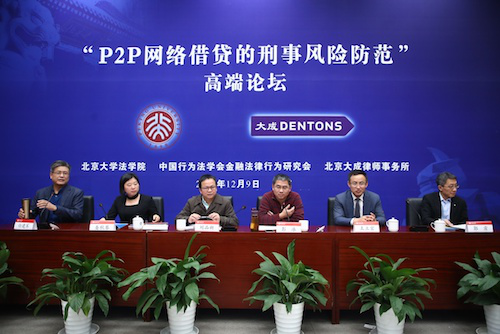
The fourth unit is "P2P Online Credit Criminal Justice Practice and Defense", chaired by Han Jiayi, senior partner of Beijing Dacheng Law Firm and secretary of the National Lawyers Association. The deputy director of the Law and Policy Research Office of the Supreme People's Procuratorate made a report entitled “Identification of illegal fund-raising on online lending platforms”, detailing the procuratorial organs' handling of Internet financial crime cases and the basic requirements for procuratorial organs to handle cases and expressed opinions on the issue of illegality, subjective intention, amount of crime, and the purpose of illegal possession in the crime of fund-raising fraud in illegal fund-raising cases. In the talks, Dr. Xu Meng, deputy director of the Kunming Municipal Public Security Bureau, based on the experience of the public security frontline, introduced the confusion and response of the public security organs in the process of standardizing law enforcement of P2P network lending crimes. The procurator of the Chongchuan District Procuratorate in Nantong City started from work, believed that the number of illegal fund-raising cases was huge, and expressed his unique views on whether funds were used for production and management, how to calculate the amount, and the determination of “squandering” in judicial interpretation. The Second People’s Court of Beijing Vice President Luo Pengfei believed that the determination of the purpose of illegal possession depended on the establishment of the rebuttal rules of criminal theory presumption, and the scale of illegal fund-raising cases was infinitely expanded, and the consequences were very serious. Xia Jingjing, a senior partner of Dacheng Law Firm Hangzhou Branch, was a female perspective. She analysis of P2P related legal phenomena and current situation. Dacheng Law Firm partner Xiao Yu, in conjunction with his own experience in purchasing P2P products, proposed a new idea of introducing third-party organizations to dispose of assets, using regulatory technology to control the entire P2P risk in one Reasonable level.
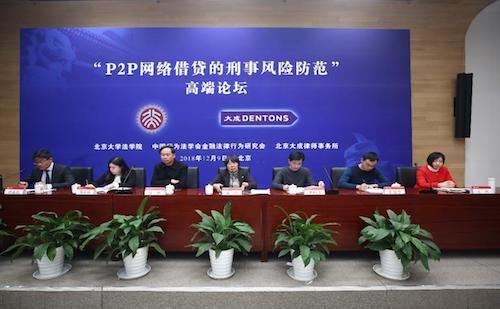
After the end of each talk session, the audience listened actively to questions and further exchanged the criminal risks and prevention issues of P2P network lending.
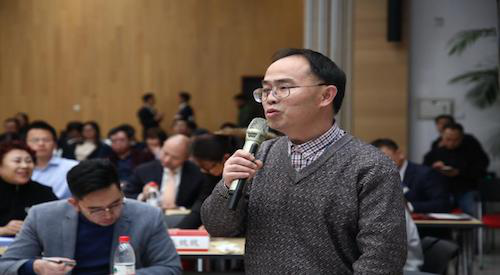
Finally, this forum was concluded by the consultant of the National Lawyers Association Criminal Committee, the honorary director of the Beijing Dacheng Law Firm Criminal Committee, and Professor Wang Xin of Peking University Law School. Director Zhai Jian pointed out that the first step should be to clearly define whether the form and format of P2P online loans had the existence value. The solution to the P2P platform problem lied in how to accurately determine the personal credit information of the borrower. Based on his 20 years of experience in financial crime research and combined with relevant data, Professor Wang Xin pointed out that the crime of illegally absorbing public deposits was currently in the “catch-up” status of the illegal fund-raising crime system, and “four for the crime of illegally absorbing public deposits”. Sexuality was briefly and profoundly analyzed. Finally, Professor Wang Xin thanked everyone for coming to the meeting with a cold, and welcomed everyone to come to Yanyuan again next year!
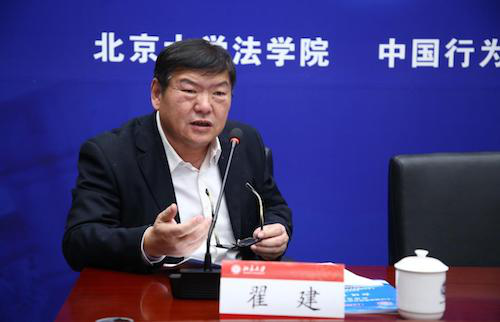

The forum aims to strengthen the understanding of P2P network lending from multiple angles and multiple industries, strengthen communication and exchanges between the theoretical and practical circles, and clarify the key points and preventive paths of criminal risk prevention for P2P network lending, and achieves good results.
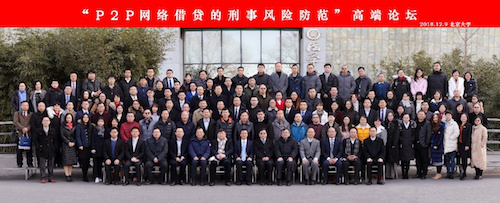
Translated by: Zhu Mengyuan
Edited by: Zhu Mengyuan



